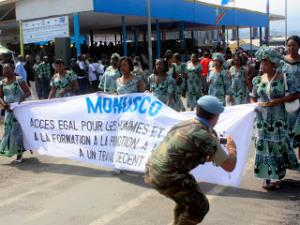 “A man can’t ride on your back unless it’s bent.” Dr. Martin Luther King.
“A man can’t ride on your back unless it’s bent.” Dr. Martin Luther King.
People and nations get what they deserve: NATO wanted Libya, and after 8 months of 24/7 bombing, it got what it was after [with the Libyan destruction, Africans lost one of their important supporters for the continent’s unification.]
I would add as well that no one gets what they want without sacrifices, sometime of their own lives. In this last scenario, the outcome only benefits then future generations. That’s the tough fact of life. Some situations even beg unfairness. It might even sound cynical, but the truth is that whatever happens to us, we have our share in it.
Look around and think about it seriously. I am sure you will agree with me at some extent. Only of course, if we reflect on the basis that all human beings everywhere, in different spaces and times, have similar brains and what differentiates them are no more than their respective and particular experiences. Unfortunately, what we generally notice is that those specific circumstances are again the ones which explain present situations and influence immensely future ones.
It’s Martin Luther King who said that, “A man can’t ride on your back unless it’s bent.” This statement is critically telling. After the signing of the Peace, Security and Cooperation Framework for the Democratic Republic of the Congo and the Region in Addis Abeba on 24/2/2013, Kambale Musavuli, Spokesperson of Friends of the Congo, asked the following question: “What is the difference between this peace framework and the General Act of the Berlin Conference signed on 26/2/1885?”
For those who might not remember their course of history, during that conference, global powerful nations of the day sat down together in Germany and in front of them a map of Africa and sliced the continent and divided it between themselves without any other consideration than their selfish interests.
The relevance of Musavuli’s question is such that if there is no effective consultation among the victims of what has been signed in Addis Abeba for an active resistance, the understanding and implementation of the peace framework will only consolidate the process started in 2011 with NATO destroying Libya, of effectively recolonising Africa.
That in 1885 an act of systematically colonizing Africa be signed by only Western nations of that time, it is somehow understandable. But it is shameful that in the 21st century another act with similar intentions be signed at the headquarters of the so-called African Union in Addis Abeba, by 11 self-styled African leaders with some pretense of being preoccupied by African interests. I don’t know if their advisers ever read history and learn from it.
At the time of slavery, there were Africans who in their majority vigorously resisted the enslavement of their people. There were others who facilitated the process. What we have witnessed with the signing of the Peace, Security, Cooperation Framework by the African heads of states falls in the last category.
Since the presence of MONUSCO in DRC has transformed the exercise of sovereign functions of a nation, it wouldn’t be wrong to formally acknowledge that the country is today under UN mandate for almost 14 years. A recent discussion among Congolese scholars reveals that MONUSCO involvement in running the country had taken away from nationals the responsibility to safeguard the interests of their people and sovereignty.
Among the last of such examples is an ultimatum that the UN institution has given to the Congolese government to stop the raping of women in Minova by two batallion units. In this particular case, facts might be verifiable and confirmed to be true. What becomes disturbing is that Kinshasa does not deny ex-actions committed by FARDC soldiers or makes any comment. And that confirms almost its nonexistence or weakness.
The events in DRC with the everyday increasing authority of UN to decide on what needs to be done for the country reminds me of another territory on the African continent where its people are the only ones to be still colonized: Saharoui. Whose fault that these people are still colonized: themselves, Moroccans who occupy Western Sahara since 1975 or the UN which does not facilitate effectively its independence. You tell me! In the case of the DRC, as the process of re-colonization is underway, whose fault could it be: Congolese themselves, UN using MONUSCO, Rwanda and Uganda, multinationals? The guess is yours.
What is certain in both the Western Sahara and DRC cases is that people free themselves. Nobody is primarily responsible of somebody else freedom or even their development.
